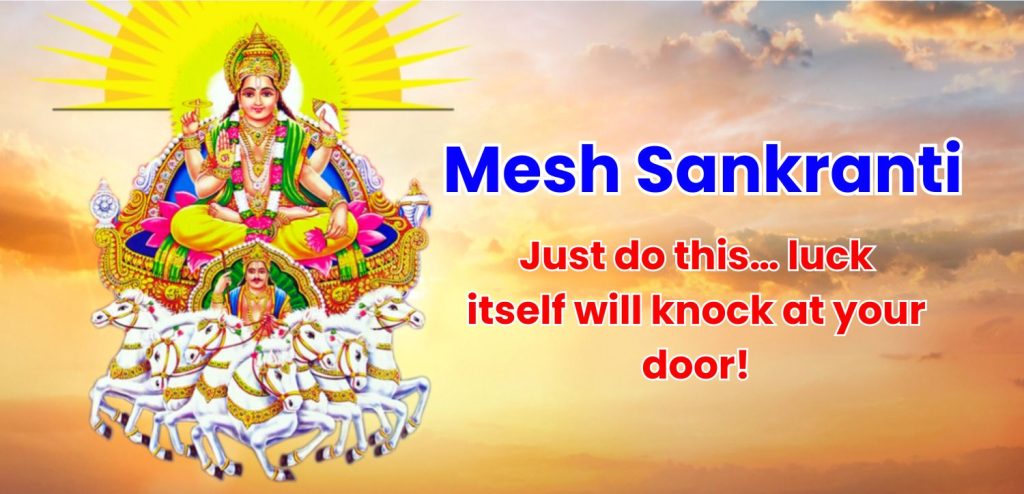According to the Hindu calendar, when the Sun God leaves Pisces and enters Aries, then that period is called Mesh Sankranti. This Sankranti is a symbol of new consciousness and new resolve. On this day, the new path of the Sun begins, which not only indicates the change of seasons, but also becomes a symbol of the rise of the new sun of auspiciousness and religious faith.
This festival is especially associated with the end of Kharmas and the beginning of auspicious works. Kharmas, which lasts for a month when the Sun moves in Sagittarius and Pisces, during that time auspicious works like marriage, housewarming, mundan, yajnopaveet are prohibited from a religious point of view. As soon as the Sun enters Aries, the doors of all auspicious works open again and the entire atmosphere is filled with a new enthusiasm, joy and spiritual energy.
When is Aries Sankranti 2025?
According to the Vedic calendar, Mesha Sankranti will be celebrated on the upcoming 14th April. On this day, the Punya Kaal time will start from 05:57 am to 12:22 pm. Apart from this, Maha Punya Kaal will start from 05:57 am to 08:05 am.
Religious Significance
Mesha Sankranti has been mentioned with special significance in mythological texts and scriptures. It is also called the beginning of ‘Solar New Year‘. This day is very auspicious for Surya Pooja, bathing, charity and chanting. Bathing in holy rivers like Ganga, Yamuna, Narmada, Godavari etc. on this day destroys the sins of births and paves the way for attaining salvation.
It is believed that from this day Lord Shri Ram started his journey towards the south to conquer Ravana. At the same time, it is also said that from this day the worship period of Lord Vishnu starts again.
Spiritual Feeling
Along with the astronomical changes, Mesh Sankranti is also a festival of awakening the Sun God within us. Just as the Sun God moves forward on his path and light triumphs over darkness, similarly we should also move forward on the path of knowledge, service and devotion by eradicating the darkness of our lives. This Sankranti brings newness in our mind, freedom from old disorders and inspiration for new good deeds.
On the day of Sankranti, offering water to the Sun God, lighting a lamp, placing a lamp near Tulsi and performing Aarti and worshiping Lord Vishnu are considered to be especially fruitful. This day is also extremely auspicious for ‘Annadan’, ‘Vastradan’, ‘Gaudan’, and ‘Swarnadan’.
This period is indicative of the movement of the Sun from ‘Dakshinayan’ to ‘Uttarayan’, when the energy of the gods is especially active on Earth. In villages and towns, events like fairs, Katha-Pravchan, Havan-Yagna, Bhagwat Paath, Rudrabhishek are organized on Mesh Sankranti. People wear new clothes and go to temples to worship Sun God and Lord Vishnu and pray for good luck in their lives.
Folk Festivals and Traditions
Mesha Sankranti is celebrated with different names in different states of India. It is celebrated with great joy as Baisakhi in Punjab, Vishu in Kerala, Puthandu in Tamil Nadu, Pana Sankranti in Odisha, Bihu in Assam, Poila Boishakh in West Bengal and Nepali New Year in Nepal. This diversity is a symbol of our cultural richness and religious unity.
There is a tradition of donating sattu, cucumber, jaggery, water, pot and fan on this day. This festival symbolizes the arrival of summer and preparation to keep the body cool. This day is considered especially fruitful for charity.
Mesha Sankranti is a day that spreads the light of auspiciousness, purity and harmony in our lives. It infuses new inspiration and hope within us, taking us from darkness to light, from inaction to action, and from ego to devotion.
On this auspicious occasion, let us shed the ignorance and laziness within us and move forward on the path of good deeds and service. Let us take a pledge on this Mesha Sankranti – to spread light in life like the Sun God, to protect Dharma like Lord Vishnu, and to dedicate ourselves to the service of humanity.
Om Suryaya Namah.
Shubh Mesha Sankranti.








